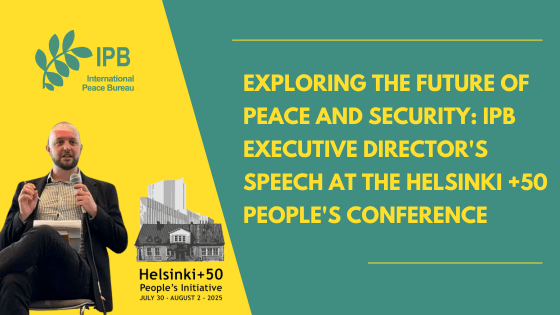The IPB Executive Director’s speech at the Helsinki +50 People’s Conference on 1 August 2025 — a conference exploring the future of peace and security in Europe and beyond, through both top-down and bottom-up approaches.
This month we mark fifty years since the Conference on Security and Cooperation in Europe. It could not come at a more vital moment, as the Russian invasion of Ukraine and genocide in Gaza – as well as the more general increase in conflicts and military tensions from Sudan and DRC to the South China/West Philippines Sea and the Korean peninsula – force us to question the role of Europe in peace, solidarity, and diplomacy in the continent and indeed internationally.
Fifty years ago, during the high tensions of the Cold War, the Helsinki summit recognized the need to reduce political and military tensions between the East and the West and to set guiding principles for relations between countries in the Helsinki Accords – a quite comprehensive document emphasizing the importance of sovereign equality, peaceful settlement of disputes, territorial integrity, human rights and freedoms, self-determination of peoples, international cooperation, and adherence to international law.
Seven years later, in 1982, the Independent Commission on Disarmament and Security Issues, known as the Olof Palme Commission, published “Common Security: A Blueprint for Survival” outlining concrete steps for disarmament and trust building which expanded on the spirit of the Helsinki Accords by clearly underlining the interconnectedness of security in the East and West blocs.
Sadly as we are all too aware, the spirit of Helsinki and of Common Security has completely disappeared in the post-Cold War era. As centers of power in geopolitics shift, a return to nationalism and national defense accompanied by shrinking democratic spaces has led to stark conventional and nuclear rearmament and proliferation and a deliberate diminishing of diplomacy, international institutions and international law. Zero-sum game understandings, black and white thinking, and strategic competition have replaced international cooperation and solidarity.
It is clear that if we leave our governments to their own devices, we can expect this trend to continue and we can expect the European and global political climates to worsen – that war and militarism will expand, costing countless lives and endanger the very future of our entire planet, the environment and climate included.
Therefore, it is on us, on civil society across Europe and across the globe, to raise our voices for the revitalization and expansion of the principles and spirit of the Helsinki Accords. We must come together to pressure our leaders– as was done in 1975 – to recognize the risks of the present moment and take urgent action to prioritize diplomacy, dialogue and trust-building as essential tools to address the polycrisis and pull us back from the brink.
We do not need a mere commemoration of 50 years since the Helsinki Accords – we need to revitalize the peace and security architecture in Europe and to reimagine Europe’s role in the world based in solidarity, anti-imperialism, anti-militarism, and international law.
European leaders now dismiss such an approach as naïve, or impossible. But we know it’s not. If in the height of tensions of the Cold War, global leaders could recognize the dangers and choose another path, there is no doubt that this can be done again. But as the political will is not there, that is our responsibility.
That is why our gathering this week in Helsinki is of vital importance – both as a symbol and a practice. It is proof that the spirit of Helsinki has not been forgotten by the people of Europe and beyond – that there is a thirst and passion for justice and for alternatives.
It is proof that civil society can move beyond narrow silos and recognize the interlinkages in our struggles and advocacy; that we understand the challenges ahead of us are bigger than any one issue, and that true peace must be based in justice, solidarity, and equality.
On behalf of the International Peace Bureau I wish you all the utmost success with this commemoration and may we continue this work together – as we fight for a just transition, a peaceful Europe, and a peaceful world. Thank you.
More information about The Helsinki+50 People’s Initiative here: https://helsinkiplus50.org/

